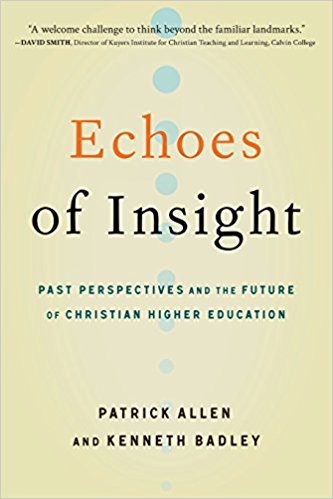
Echoes of Insight: Past Perspectives and the Future of Christian Higher Education
Date Reviewed: December 12, 2017
In Echoes of Insight: Past Perspectives and the Future of Christian Higher Education, co-authors Patrick Allen and Kenneth Badley mine voices from the past for fresh wisdom to assist Christian universities in their efforts to balance programming (glitz), the pursuit of truth (glue), and the goal of being transforming institutions “for the sake of the Kingdom (300)” (hope).
The text is a response of hope, intended to refocus the mission, identity, and curriculum of Christian universities on its well-being and its ultimate purpose, which is "to provide a clear and rigorous program of instruction, spiritual formation, and vocational preparation (255).” The text, therefore, proposes a distinct move away from the sometimes exclusive, albeit important, conversations around money, branding, and jobs for graduates. To do this work, the authors examine eleven influential thinkers of education. Using a format that very closely resembles the multiple editions of Daniel L. Pals’s Theories of Religion, each chapter in Echoes of Insight offers a brief biography, a synopsis of classic and relevant works, a discussion of applicable ideas, and questions for reflection.
Part One: “The Classroom and the Student Instruction, Formation, and Vocation,” introduces five thinkers and attempts to connect their ideas with the perceived “challenges faced by Christian higher education in the twenty-first century (18).” Part One begins with Alfred North Whitehead, but the works of Dorothy Sayers, Hannah Arendt, Flannery O’Connor, and Maria Montessori, via their respective chapters, come alongside to help to facilitate a larger discussion on the human experience and the current challenges faced by Christian universities. Cooperatively, these works support Whitehead’s claim that “all parts of a student’s education should fit together epistemologically and should connect to the student’s day-to-day life (29).” In other words, how faculty members treat students, how colleagues convey mutual respect, or where the roots of authority lie all contribute to the students’ learning experience.
Part Two: “The Faculty and the Administration: Mission, Vision, and Values,” examines the work of John Henry Newman, Abraham Flexner, Thorstein Veblen, Jose Ortega y Gasset, Robert Maynard Hutchins, and Karl Jaspers. Unlike Part One, the thinkers included in Part Two are those who had a vested interest in higher education and maintained distinct ideas about the university and the pursuit of truth. Allen and Badley found that all agreed that a common mission, a strong academic program, an emphasis on learning, and the freedom to pursue truth were essential.
Overall, the text is an enjoyable read. In fact, although it is written for a scholarly audience, the authors’ often tongue-in-cheek humor makes the manuscript a rather accessible and entertaining page-turner. More importantly, the authors’ passion and genuine interest in the success of Christian higher education makes Echoes of Insight both engaging and insightful.
Echoes of Insight is an important work and a valuable addition to this area of scholarship. Thankfully, the authors are already planning a more inclusive and diverse second edition, because the current text falls short in these areas. Indeed, the glaring absence of writers, theologians, or philosophers of color is problematic. Such an omission not only silences and makes invisible select people groups, but it also disregards the distinct experiences of minority students on predominantly white Christian campuses. Consequently, this text, whose argument is predicated on integration, connection, and the unhindered pursuit of truth, failed to take seriously just how much race and racism in American education and American Christianity unjustly impacts people of color and negatively informs their day-to-day life and learnings experiences. Thereby rendering many of them grossly untouched by Allen and Badley’s vision of a transformational institution.
Given the philosophical and theoretical emphases of Echoes of Insight, graduate students and specialists (namely faculty and administrators) with scholarly interests in this subject matter would benefit most from reading this text.